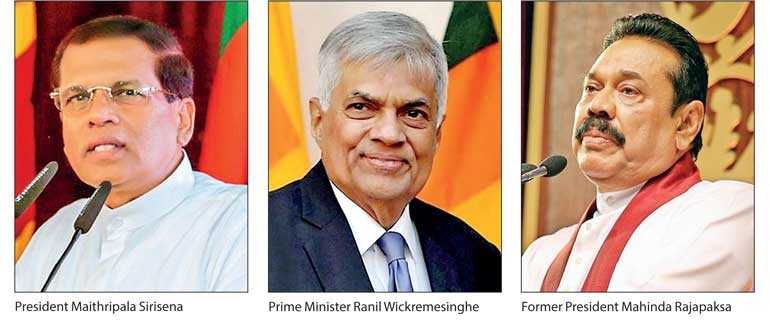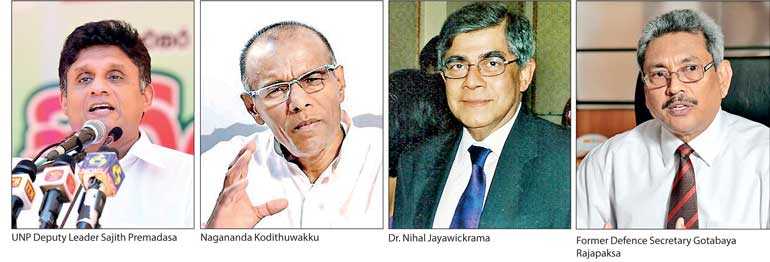Sunday Feb 15, 2026
Sunday Feb 15, 2026
Friday, 2 August 2019 00:00 - - {{hitsCtrl.values.hits}}


Sri Lanka can be compared to a patient in a critical condition requiring immediate surgery for its survival. But the attention of all politicians in the country is focussed not on the patient or the condition of the patient. Instead, they are concerned about the forthcoming Presidential Election. This situation will distract the attention on the patient and inevitably worsen the sickness of the patient. 
Whoever wins the forthcoming Presidential Election, it will not be a remedy for the sickness of the patient. Even after the Presidential Election, the attention of everyone will be focused not on the patient; instead, it will be directed on the next Parliamentary Election. Not only the country, the entire political regime of the country is in an insurmountable crisis. The public confidence in traditional political leaders has not stopped evaporating, instead the process of them being refused is being aggravated. The people have lost faith in all political leaders. They perceive them with an ever-increasing sense of humour and contempt. This can be considered an unprecedented trend not witnessed in Sri Lanka before.
The country’s Constitution is also in a big mess. Though the official status of President of Sri Lanka has been reduced to a level of a nominal Head of State by the 19th Amendment passed in a cryptic and spurious manner, abolishing the powers held by the President and transferring them to a Cabinet of Ministers headed by the Prime Minister elected by the Parliament, strangely the powerless President is still being elected from an island-wide election held, treating the entire country a single electorate. The expense the Government is brought to bear in this connection is immense. Apparently, Sri Lanka is the only country where a nominal president is elected by a General Election incurring a massive cost.
The status and the role of the next president
Not only the average voter, the presidential candidates themselves do not seem to have a clear knowledge of the true nature of the next president of Sri Lanka and the extent of his powers.
I can be considered the first person to reveal that the status of the next president will be more or less similar to that of the President William Gopallawa under the 1972 Constitution. This I did in August 2018. I was compelled to make this announcement to enlighten the people of this country about the true position of the next president in an atmosphere in which several prospective presidential candidates had begun to brag about the ambitious plans of action that they were going to initiate to save the country from its present plight, upon their election to the office of president. I wanted to show the people the futility of their braggadocious claims on effecting grand reform measures which the next president will not be able to do.
Sometime later, on 10 June, Dr. Nihal Jayawickrama published an interesting analysis under the topic ‘The Presidential Hopefuls – Have They Not Read Article 43’ on the true status and the powers of the next president. Dr. Nihal Jayawickrama can be described as one of the few eminent scholars having an expertise knowledge and experience in the subject of constitution.
In his analysis, Dr. Nihal Jayawickrama has clearly pointed out that the position of the next President will be similar to that of President William Gopallawa under the 1972 Constitution or the previous governors who held the post prior to him; from day one of the election of the next president, the present presidential system of governance will be transformed to a system of parliamentary governance; from then onwards , it is the policies and programs of the political party that commands the majority of seats in Parliament that will be implemented throughout the country, and not the policies of the president elect.
As he has pointed out further, the steering of the Government, in terms of Article 42 of the constitution, will be entrusted to the Cabinet of Ministers headed by the Prime Minister, and not the President. Under Article 45, only a Member of Parliament may be appointed a Minister. It was an unprecedented transitional provision (Article 51) in the 19th Amendment that enabled President Sirisena to assign to himself the Ministries of Defence, Mahaweli and Environment. That transitional provision ceases to operate when President Sirisena ceases to hold the office of president. The next president will not be entitled to assign to himself any ministry or any subject or function of government; not even the Ministry of Defence.
Dr. Nihal Jayawickrama further states that the next president will of course continue to enjoy the traditional rights of a Head of State. According to examples cited by him, the president may declare war; however, his declaration of war will not be effective or operational unless the minister of defence supports him providing necessary manpower and weaponry to engage in warfare; the president may appoint ambassadors, but his nominees will not be able to enter the territory of the state to which they have been accredited unless the minister of foreign affairs has sought and obtained the “agreement” of the receiving state; he may declare a state of Emergency, but that declaration would be futile unless the cabinet of ministers provides the human and other resources to enforce it, and the declaration is then approved by Parliament.
Groping in the dark
Despite the reality of powers of the next president being such, it is evident that not only the average voter but also the prospective candidates running for the forthcoming Presidential Election do not seem to possess a proper knowledge of it. Even matured political leaders who are well aware of this situation have sadly refrained from explaining it to the people. Perhaps, they must be thinking that to do so might discourage the people’s enthusiasm and make it difficult for them to reap votes at the election, if they were to enlighten the people of the true picture of the situation.
Even the candidates themselves must be trying to appropriate a false importance to the post of president, which of course it lacks, with a view to promoting and sustaining the enthusiastic participation of their followers in the election campaign. It is inevitable that a president elected consequent to raising false expectations and confidence in the people to become an object of ridicule, soon, in the public eye.
There is hardly anything that the next president is expected to perform except for working in harmony with the present Parliament and on the advice of the Cabinet of Ministers headed by the Prime Minister, until the next General Election. Even after the General Election, he has no other choice but to work as the nominal Head of State, on the advice of the newly-elected Prime Minister and the Cabinet of Ministers following the parliamentary election.
All candidates desirous and dreaming of contesting the Presidential Election appear to have lost their proper sense to a certain extent. Of them, Nagananda Kodithuwakku can be considered the one who had lost it to a great extent. He claims that he has drafted a constitution for Sri Lanka which he will present to the people at the next Presidential Election which he envisages to contest and if he wins and is elected president, it will be implemented forthwith, on the assumption that the election victory will signify people’s approval for the adoption of the Constitution. Accordingly, all MPs of the Parliament will be chased out from their positions. In addition to that, all judges of the Supreme Court too, will be removed from their positions, he claims. He further claims to reduce the number of MPs to 60.
An existing Constitution will not become invalid spontaneously. There is a formal method to be adopted in abolishing a Constitution. Contesting an election presenting a draft constitution, and winning the election alone will not allow it to be made the Constitution of the country. Nagananda is contesting for an office of the nominal Head of State which has no executive powers. It is only a nominal post. It is like a person appointed to the post of the former Governor General imagining himself the Executive Head of the State. The way he thinks to remove the MPs and the Supreme Court judges is not only comical and ludicrous but also dictatorial. The positions of Supreme Court judges are among the most secure government jobs all over the world. They can be dismissed from their positions only by a motion of impeachment.
If a candidate to an Indian election had made an unscrupulous statement like that, the Indian election commission wouldn’t have tolerated such utterances and have adopted a stern policy against the candidate.
Crisis of the Presidential Election
Not only the country and the State, even the Presidential Election is in a great crisis. It can be seen that there is a big crisis over the candidate to be fielded by the two major political power groups.
Gotabaya Rajapaksa appeared to have been launching a big campaign to secure the presidential candidacy for himself. However, Mahinda Rajapaksa, the leader of Podujana Peramuna doesn’t seem prepared to choose Gotabaya, his own brother, as the presidential candidate as he doesn’t like to have his recognition of leadership being diminished. It is also evident that there is a clique in the Podujana Peramuna not prepared to bow down to the decision of the leader.
Even the UNP is faced with a similar crisis in this regard. Ranil is not prepared to handover the party leadership to Sajith. But, the majority support of the second tier leaders of the party is seen to be for Sajith.
President Maithripala Sirisena too doesn’t seem to have given up hope of contesting the presidential election, completely. It is clear that his expectation is to weaken the two major power groups and emerge victorious in the next presidential contest.
The Constitution of the party appears to have impacted on the crisis of the UNP in regard to its presidential candidate. According to the Constitution of the UNP, the president will become the ex-officio leader of the party. This Clause was included in the party Constitution when the presidential system of governance was introduced. Following the 19th Amendment the presidential system of governance has now been changed and the office of Prime Minister is more powerful than that of the nominal president. However, as the Party Constitution had not been amended to suit the present situation, it can be said to have posed a problem in causing confusion within the party.
Uncertainty and anarchy
Whoever will be the next president, he will not be able to make a significant impact on the State rule as he would remain only a nominal Head of the State. If, however, the person who gets elected as the president attempts to arrogate a super power into his office which it lacks constitutionally, invariably he will end up becoming a humorous comedian in a very short time. In the near future, people will realise that the next president will have only a nominal power. The more they realise this fact, the less it becomes their interest in the Presidential Election.
Sri Lanka is presently going through a fast-changing socio political atmosphere which had never been witnessed before. In this backdrop, everything considered as sacred are being questioned; the recognition enjoyed by the traditional political parties and political leaders are fast evaporating.
Presently, we are living in a unique historical era in which a large number of incidents capable of changing the way people think, occurring in rapid succession. The number of incidents that took place during the past few months was immense. This situation has convinced the people of the reality or the true status of the country. It has accelerated the shifting of the country towards anarchy.
The rejection of eminent people who had posed themselves as distinguished characters in almost every sector of the society can be considered the most significant feature inherent in this internal change occurring in the process of social transformation.
Dhammika Perera is a classic example that can be cited to illustrate this scenario. He bragged about his ability to save Sri Lanka. The media too, gave a wide exposure to his speech. Concurrently, a rumour had spread that he was going to be the presidential candidate of the UNP headed by Prime Minister Ranil Wickremesinghe. It took only a very short time for the image of this hero that had been building to crumble down. The incident of importation of garbage containers ruined his name completely.
This can be considered a unique feature inherent in the crisis Sri Lanka is facing. This is not a situation confined only to Dhammika Perera. It is equally relevant to all other candidates contesting the Presidential Election. Some of them may perish before they enter the battlefield for special reasons. Some others may get caught in the cycle when they enter the field. Even the one who eventually wins the race is likely to suffer a lot, prior to his victory, during the course of the election process.
What can happen?
The important thing we must realise is that Sri Lanka is currently going through a period of great crisis that usually occurs prior to a significant transformation. It is a crisis that had overwhelmed every sector of the country. It is in a situation extant with incidents occurring one after the other and sometimes several huge incidents are occurring simultaneously causing a big explosion by the accumulation of such incidents. This big explosion may occur after or even before the Presidential Election. It can even be a great explosion which may lead to the collapse of the entire system.
On the other hand, the Presidential Election can turn into a people’s cyclone whirling against the wicked and corrupt system that prevails in the country. Even if nothing of this sort happens and the election is held and a new president is elected, the crisis of the country will not end. Meantime, if we fail to orientate the country towards a structural change, unavoidably the entire system may sustain a great collapse.
Sri Lanka has fallen into this state of wretchedness as the political regime of the country didn’t have an approach to rectify serious errors as and when they happened without letting them fossilised in the system itself. On the other hand, this situation has resulted in abstaining from effecting necessary reforms to restore the State and the institutional system when a breakdown is seen in the system.
Following the gaining of independence, there was no effort for nation building or rebuilding of the State regained from the British to suit the needs of the nation. As a result, Sri Lanka was compelled to live in an uncivilised atmosphere extant with protracted violence and bloodshed for a very long period of nearly 30 years. This uncivilised atmosphere led to corrupt and deform not only the State and the society but also almost every aspect of the country.
After ending the internal civil war, the State and the society should have been reconstructed having had a retrospective look at what went wrong with the country. But, the leader who won the internal war did not do it; similarly, the Yahapalana leaders who ascended the power defeating the former too, failed to do that. The deterioration of the country can be treated as an outcome of this failure. Regrettably, the stupid and selfish political regime of our country has miserably failed to open its eyes even after the tragedy of Easter Sunday.